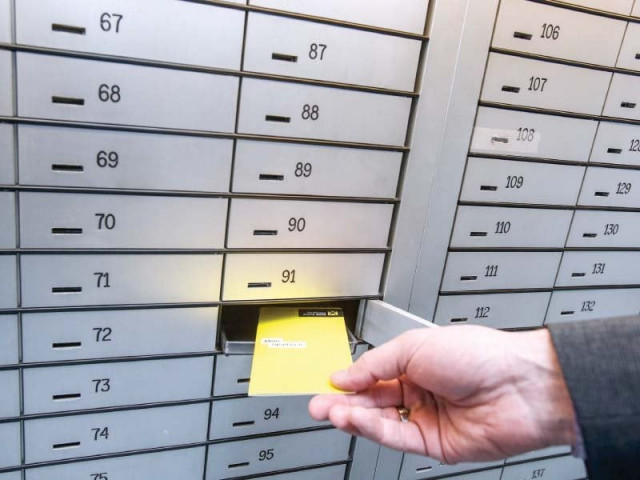FBR seeks access to bank lockers of tax defaulters
Tax authorities have proposed amendments to Incom Tax Rules 2002

Recently, provincial governments of Punjab and Sindh have complained to the federal government about FBR’s unbridled powers to make recoveries from their accounts. PHOTO: REUTERS
The FBR has proposed that a new chapter should be inserted into the Income Tax Rules of 2002 aimed at regulating the recovery of taxes from the people who hold money on behalf of taxpayers.
The rules have been framed under the Income Tax Ordinance 2001, which is completely silent on the word “locker”.
The FBR has proposed draft amendments to the Income Tax Rules 2002 and has sought suggestions within seven days. The draft rules will soon be placed on the FBR website.
In case the FBR does not receive objections or turns down any reservations expressed by the stakeholders, the rules will come into effect within two weeks of its placement on the website.
Tax authorities have proposed a definition with a wide scope where the FBR can recover taxes from an employer owing or who may owe salary to its employee, a tenant owing or who may owe rent to its landlord, or a debtor owing or who may owe money to the taxpayer.
According to the proposed rule 210A (b), the money or an asset placed in bank lockers has also been recommended to be brought under the scope of the FBR and it may now get access to the lockers.
“Holding or who may hold” includes bank accounts, TDRs (Term Deposit Receipts), CDRs (Call Deposit Receipts), fixed deposits or money held in lockers, states the rule 210A (C).
However, the Income Tax Ordinance 2001 does not allow the FBR to recover money from the bank lockers of citizens.
When contacted, FBR spokesman Dr Hamid Atiq Sarwar said the recovery rules were being framed on the directives of the Lahore High Court. Once cleared by the court, the proposed rules would be placed on the FBR website to seek comments of the stakeholders, he said.
The purpose of the proposed rules was to streamline FBR’s discretion in the recovery cases, and not to give it more discretionary powers, said Sarwar, who is also the member FBR Inland Revenue Policy.
He pointed out that the recovery powers would be limited to the legal mandate given in Section 140 of the Income Tax Ordinance. The proposed rules would also be vetted by the Ministry of Law and Justice, the spokesman said.
However, Section 140 does not give the FBR powers to recover money from the bank lockers of citizens.
Recently, the provincial governments of Punjab and Sindh have also complained to the federal government about the FBR’s unbridled powers to make recoveries from their accounts.
Taxpayers, including big corporate firms, have also been consistently complaining about the FBR’s moves to take out money from their bank accounts without their consent, particularly during June to meet the tax targets.
Now, the FBR also wants to bring bank lockers under its ambit, which may cause more uncertainty.
According to the draft rules, the powers to serve notice of recovery are proposed to rest with the Inland Revenue Service commissioner who, in case where any tax is due under Section 137 of the Income Tax Ordinance, can serve a notice on any person.
A copy of the notice will be forwarded to the defaulter at his last known address, and in case an account or money is held jointly, to all the joint holders on their last known address, according to the rules.
Recovery of tax from the bank accounts, lockers, salary and house or land rent will be made only to the extent of tax due by the taxpayer.
According to the proposed rules, in case the money is held jointly with any person other than the defaulter, the share of the joint holders in such an account will be presumed, until the contrary is proved, to be equal.
In case of a dispute, the commissioner will decide the matter under this rule within one month of preference of claim or making of objection.
Where a person fails to comply with a notice in the manner provided in rule 210C, the person will be personally liable to pay the amount to the commissioner who may pass an order to that effect and seek to recover the same, recommended the FBR.
Published in The Express Tribune, January 30th, 2020.
Like Business on Facebook, follow @TribuneBiz on Twitter to stay informed and join in the conversation.



















COMMENTS
Comments are moderated and generally will be posted if they are on-topic and not abusive.
For more information, please see our Comments FAQ